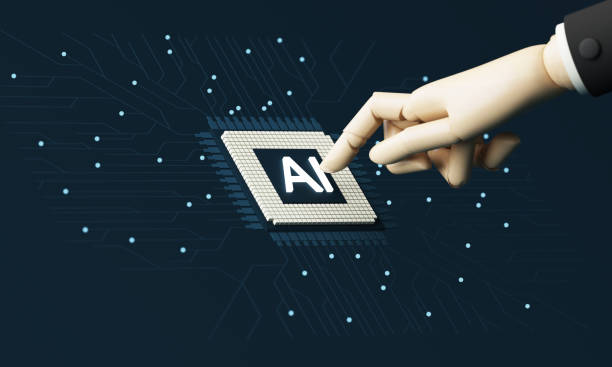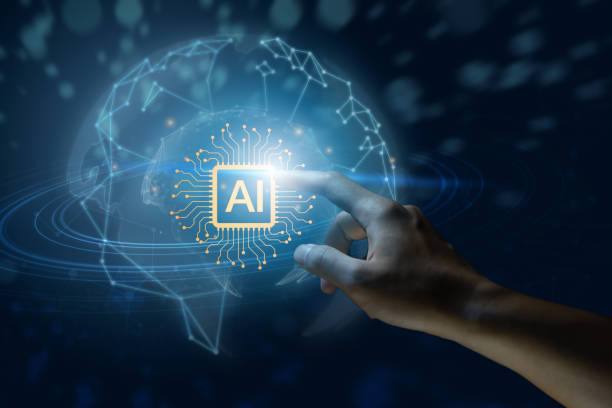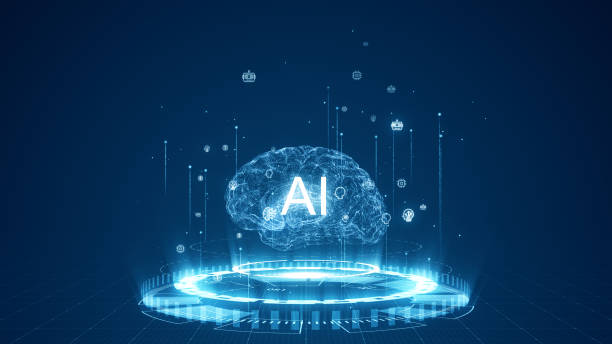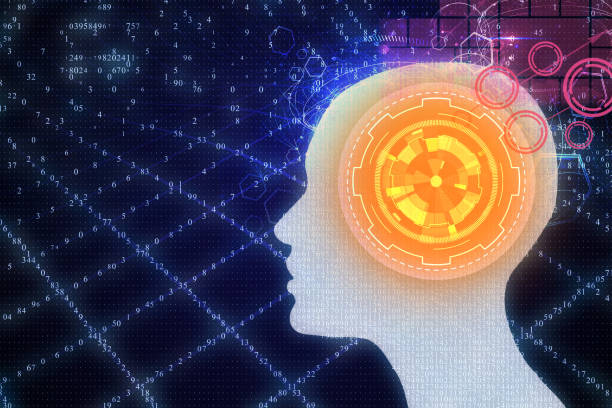`
What is Artificial Intelligence? Definition, History, and Basic Concepts

#Artificial_Intelligence (AI) is a branch of computer science that deals with building machines that can perform tasks that typically require human intelligence.
These tasks include learning, problem-solving, language understanding, and pattern recognition.
The history of artificial intelligence dates back to the 1950s when scientists like Alan Turing and John McCarthy began exploring the possibility of building thinking machines.
The term “artificial intelligence” was first coined by John McCarthy in 1956.
In the early years, the focus was on solving logical and symbolic problems.
With the advancement of technology, new approaches such as machine learning and neural networks emerged, enabling the solution of more complex problems.
Basic concepts of artificial intelligence include:
- Machine Learning
- Neural Networks
- Natural Language Processing
- Computer Vision
- Robotics
These concepts are combined to create systems that can perform various tasks, from facial recognition to self-driving.
For more information on the history of artificial intelligence, you can refer to the Wikipedia article.
Is your current e-commerce website design not generating the expected sales?
Rasaweb is a specialist in professional e-commerce website design!
✅ An attractive and user-friendly site aimed at increasing sales
✅ High speed and security for an ideal shopping experience⚡ Get a free online store design consultation with Rasaweb!
Types of Artificial Intelligence: A Detailed Look

Artificial intelligence can be categorized into different types based on capabilities and functions.
The two main categories include Narrow AI and General AI.
Narrow AI refers to systems designed to perform a specific task and perform well in that area.
Examples of Narrow AI include facial recognition systems, product recommendation systems, and voice assistants such as Google Assistant and Siri.
These systems are not capable of performing tasks beyond their designed scope.
General AI refers to systems that have general intelligence and can perform any task that a human can do.
This type of artificial intelligence is still under development and has not been fully realized.
The main difference between these two types is their general capabilities and flexibility.
General AI is capable of learning, reasoning, and solving problems in various fields, while Narrow AI specializes only in a specific field.
Also, artificial intelligence can be divided into other categories based on how it learns, such as supervised learning, unsupervised learning, and reinforcement learning.
Each of these methods is suitable for solving specific problems.
Applications of Artificial Intelligence in Today’s World

The applications of #Artificial_Intelligence in today’s world are very broad and diverse.
From medicine and healthcare to finance and marketing, artificial intelligence is transforming various industries.
In medicine, artificial intelligence is used to diagnose diseases, develop drugs, and provide personalized care.
Intelligent systems can analyze medical images and identify disease patterns.
In finance, artificial intelligence is used to detect fraud, manage risk, and provide financial advisory services.
Intelligent algorithms can identify suspicious patterns and prevent fraud.
In marketing, artificial intelligence is used to analyze customer data, deliver targeted advertising, and improve customer experience.
Recommendation systems can suggest products and services to customers that they are likely to be interested in.
In the manufacturing industry, artificial intelligence is used to automate processes, improve quality, and reduce costs.
Intelligent robots can perform repetitive and dangerous tasks.
In addition, artificial intelligence has many applications in other fields such as education, transportation, and security.
Self-driving cars, facial recognition systems, and virtual assistants are just a few examples of artificial intelligence applications that have affected our lives.
| Industry | Application |
|---|---|
| Medicine | Disease diagnosis, drug development |
| Finance | Fraud detection, risk management |
| Marketing | Data analysis, targeted advertising |
| Manufacturing | Automation, quality improvement |
Advantages and Disadvantages of Artificial Intelligence: A Critical Look

Artificial intelligence has many advantages, including increased efficiency, reduced errors, and improved decision-making.
Intelligent systems can perform tasks faster and more accurately than humans.
However, artificial intelligence also has disadvantages, including job losses, ethical concerns, and the potential for abuse.
Automating processes may lead to the loss of traditional jobs.
Ethical concerns include privacy, discrimination, and accountability.
The potential for abuse of artificial intelligence exists in various fields.
To minimize the disadvantages and maximize the benefits, it is necessary to develop and use artificial intelligence carefully and responsibly.
Policymakers, scientists, and the public must work together to ensure that artificial intelligence is used for the benefit of all society.
Developing ethical standards and laws related to artificial intelligence is essential.
There are many discussions about the social and economic impacts of artificial intelligence.
Some believe that artificial intelligence can help solve major global problems, while others are concerned about its negative consequences.
To have a realistic view, it is necessary to consider both the positive and negative aspects.
Are you tired of your company’s website failing to meet your expectations? With Rasaweb, design a professional website that showcases the true face of your business.
✅ Increase new customer acquisition and sales leads
✅ Increase your brand’s credibility and trust with your audience
⚡ Get a free website design consultation!
Machine Learning: The Beating Heart of Artificial Intelligence

Machine Learning is one of the most important sub-branches of #Artificial_Intelligence that allows systems to learn from data without explicit programming.
In machine learning, algorithms discover patterns and relationships using training data and then use these patterns to predict or make decisions about new data.
There are different types of machine learning algorithms, including supervised learning, unsupervised learning, and reinforcement learning.
In supervised learning, the algorithm is trained using labeled data.
Labeled data includes inputs and expected outputs.
The goal of the algorithm is to create a model that can predict the correct outputs for new inputs.
In unsupervised learning, the algorithm is trained using unlabeled data.
The goal of the algorithm is to discover hidden patterns and structures in the data.
In reinforcement learning, the algorithm learns how to make optimal decisions by interacting with an environment and receiving feedback.
Machine learning is used in various fields such as facial recognition, speech recognition, market prediction, and fraud detection.
With the advancement of technology and the increase in data volume, the importance of machine learning is increasing day by day.
Neural Networks: Modeling the Human Brain

Neural Networks are one of the most important machine learning models that are inspired by the structure and function of the human brain.
A neural network consists of a large number of nodes (or neurons) connected in layers.
Each node receives an input, processes it, and produces an output.
The connections between the nodes have weights that are adjusted during the learning process.
Neural networks can learn complex patterns and perform various tasks, including image recognition, language processing, and time series prediction.
There are different types of neural networks, including artificial neural networks (ANN), convolutional neural networks (CNN), and recurrent neural networks (RNN).
Artificial neural networks are suitable for solving general problems.
Convolutional neural networks are used for image and video recognition.
Recurrent neural networks are used for processing sequential data such as text and speech.
Neural networks are widely used in various fields such as medicine, finance, marketing, and manufacturing.
With the advancement of technology and the increase in computing power, neural networks are able to solve more complex problems and provide more accurate results.
Challenges and Future of Artificial Intelligence

#Artificial_Intelligence faces several challenges, including data scarcity, computational limitations, ethical concerns, and the need for expertise.
A large amount of data is needed to train artificial intelligence models.
Processing large data and training complex models requires high computing power.
Ethical concerns include privacy, discrimination, and accountability.
Developing and using artificial intelligence requires expertise in various fields such as computer science, mathematics, and statistics.
Despite these challenges, the future of artificial intelligence looks very bright.
Technological advances, increasing data volume, and decreasing computing costs enable the development of smarter and more efficient systems.
Artificial intelligence is expected to play a more important role in our lives in the future and help solve major global problems.
Among the areas where artificial intelligence is expected to have a significant impact are medicine, energy, the environment, and space.
| Challenge | Description |
|---|---|
| Data scarcity | Need for a large amount of data for training |
| Computational limitations | Need for high computing power |
| Ethical concerns | Privacy, discrimination, accountability |
| Need for expertise | Expertise in computer science, mathematics, statistics |
How to Learn Artificial Intelligence? Resources and Strategies

Learning artificial intelligence requires a combination of theoretical knowledge and practical skills.
There are various resources for learning artificial intelligence, including online courses, books, scientific articles, and practical projects.
To get started, you can take free or paid online courses on sites like Coursera, edX, and Udacity.
These courses usually cover the basic concepts of artificial intelligence, machine learning, and neural networks.
You can also use reference books and scientific articles to deepen your knowledge.
To gain practical skills, you can participate in artificial intelligence projects and practice coding.
To learn artificial intelligence, you need to be familiar with programming languages like Python and R.
Also, knowledge of mathematics and statistics is necessary to understand the concepts and algorithms of artificial intelligence.
To get started, you can take online courses in mathematics and statistics.
In addition, attending artificial intelligence conferences and workshops can help you get acquainted with the latest developments and trends in this field and connect with other experts and researchers.
It is also important to specialize in a field that interests you.
Artificial intelligence has many applications, so you can choose a field that matches your interests and skills.
For example, if you are interested in medicine, you can specialize in artificial intelligence in medicine.
Does your company’s website perform as it should for your brand? In today’s competitive world, your website is your most important online tool. Rasaweb, a specialist in professional corporate website design, helps you to:
✅ Attract customer loyalty and trust
✅ Convert website visitors into customers
⚡ Get a free consultation!
Important Tools for Artificial Intelligence Development

For developing #Artificial_Intelligence, there are various tools that help you to perform the development process faster and more efficiently.
Some of the most important tools include machine learning libraries, software development frameworks, and cloud platforms.
Machine learning libraries like scikit-learn, TensorFlow, and PyTorch are powerful tools that implement machine learning algorithms and allow you to quickly train and evaluate artificial intelligence models.
Software development frameworks like Keras and Fastai are higher-level tools that simplify the process of building and deploying artificial intelligence models.
Cloud platforms like Google Cloud, AWS, and Azure provide access to computing resources and artificial intelligence services.
In addition, there are other tools that are used for data preprocessing, data visualization, and model evaluation.
For data preprocessing, you can use libraries like pandas and NumPy.
For data visualization, you can use libraries like Matplotlib and Seaborn.
For model evaluation, you can use tools like TensorBoard and MLflow.
Choosing the right tool depends on your needs and skills.
To get started, you can use libraries like scikit-learn and TensorFlow.
As you progress in this field, you can learn and use more advanced tools.
The Near Future of Artificial Intelligence: What Do We Expect?

In the near future, artificial intelligence is expected to make significant progress in various fields.
Among the areas where artificial intelligence is expected to have a significant impact are self-driving cars, personalized medicine, advanced robotics, and smarter virtual assistants.
Self-driving cars can make transportation safer and more efficient.
Personalized medicine can provide more effective and targeted treatments.
Advanced robotics can perform dangerous and repetitive tasks.
Smarter virtual assistants can help us perform daily tasks.
In addition, artificial intelligence is expected to make significant progress in other fields such as education, energy, the environment, and space.
Artificial intelligence can help improve the quality of education, reduce energy consumption, protect the environment, and explore space.
However, it is necessary to develop and use artificial intelligence carefully and responsibly to prevent its negative consequences.
Policymakers, scientists, and the public must work together to ensure that artificial intelligence is used for the benefit of all society.
The future of artificial intelligence is full of opportunities and challenges.
By developing and using this technology correctly, we can create a better life for ourselves and future generations.
Frequently Asked Questions
| Question | Answer |
|---|---|
| What is the definition of Hoosh Masnooi (Artificial Intelligence)? | It is a field in computer science that aims to create intelligent machines that can think, learn, solve problems, and make decisions like humans. |
| Mention some common applications of Artificial Intelligence. | These include self-driving cars, voice assistants (such as Siri and Alexa), recommendation systems (such as Netflix and Amazon), facial recognition, and medical diagnosis. |
| What is the difference between Narrow AI (ANI) and General AI (AGI)? | Narrow AI specializes in one specific task, while General AI possesses human intellectual ability to perform any cognitive task. |
| What is Machine Learning and its relationship to Artificial Intelligence? | Machine learning is a branch of artificial intelligence that focuses on developing algorithms that allow systems to learn from data without explicit programming. |
| What are Artificial Neural Networks? | These are computational models inspired by the structure and function of the human brain, used in deep learning to process data and discover complex patterns. |
| Mention some ethical challenges related to Artificial Intelligence. | These include issues of privacy, bias in data and algorithms, job loss, and responsibility in the event of errors or unfair decisions. |
| What is Natural Language Processing (NLP)? | It is a branch of artificial intelligence that focuses on enabling computers to understand, interpret, and generate human language in a useful and interactive way. |
| How can Artificial Intelligence affect the labor market? | It can lead to the automation of some routine tasks, requiring workers to be retrained and creating new jobs in the design, development, and maintenance of artificial intelligence systems. |
| What is Computer Vision? | It is a field in artificial intelligence that enables computers to “see,” understand, and interpret images and videos in the same way that humans do, enabling them to recognize objects and faces. |
| What is the importance of data in the development of Artificial Intelligence systems? | Data is the fuel that feeds artificial intelligence systems, especially in machine learning. The quality and quantity of data greatly affect the accuracy and performance of models and their ability to learn and make correct decisions. |
And other services of Rasa Web Advertising Agency in the field of advertising
Intelligent Conversion Rate Optimization: Designed for businesses looking to attract customers through intelligent data analysis.
Intelligent Website Development: An innovative platform to improve user interaction with marketing automation.
Intelligent Data Analysis: Designed for businesses looking to manage campaigns through Google Ads management.
Intelligent Custom Software: A fast and efficient solution for improving SEO ranking with a focus on dedicated programming.
Intelligent Social Media: Professional optimization for digital branding using marketing automation.
And more than hundreds of other services in the field of internet advertising, advertising consulting, and organizational solutions
Internet Advertising | Advertising Strategy | Advertorials
Resources
What is Artificial Intelligence?
,What is Artificial Intelligence? (Educational Video)
,Artificial Intelligence on Wikipedia
,What is Artificial Intelligence, Its Types and Applications
? With Rasaweb Afarin, the digital future of your business is in our hands. We guarantee a powerful and influential presence for you by providing comprehensive services in the field of SEO, content marketing, and multilingual website design.
📍 Tehran, Mirdamad Street, next to the Central Bank, South Kazerun Alley, Ramin Alley, No. 6
`




